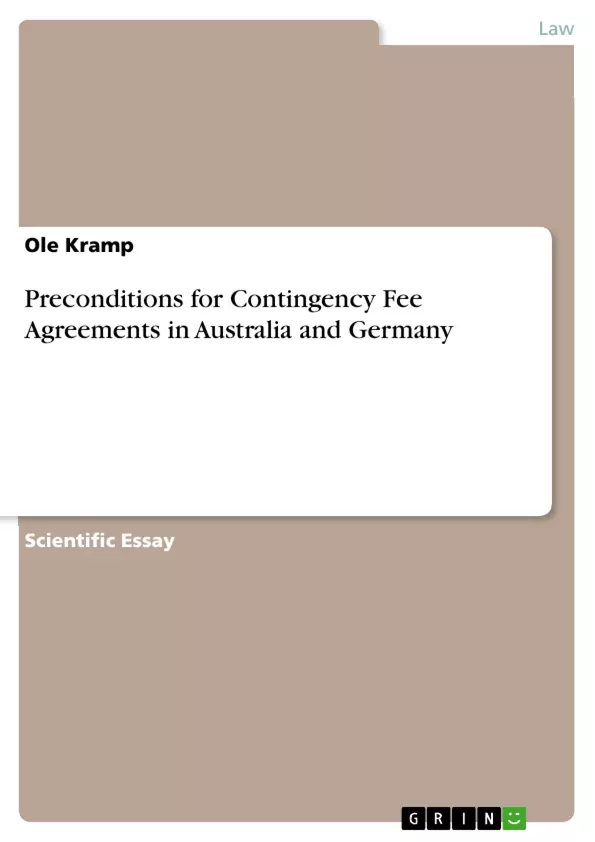
Preconditions for Contingency Fee Agreements in Australia and Germany
Wissenschaftlicher Aufsatz, 2008
27 Seiten, Note: 83 percent
Leseprobe
Inhaltsverzeichnis (Table of Contents)
- I INTRODUCTION
- II TERMINOLOGY
- III AUSTRALIA
- A Forms of contingency fees in Australia
- 1 Conditional fee
- 2 Uplift fee
- 3 No contingency fees in the narrow sense
- B Preconditions for contingency fees
- 1 Excluded matters relating to the conditional fee agreement
- 2 Written form and informing the client
- 3 Description of the conditions for successful outcome
- 4 "Cooling-off period"
- A Forms of contingency fees in Australia
- IV GERMANY
- A Historical development
- B Forms of contingency fees
- C Preconditions for conditional fees
- 1 Written form
- 2 Prerequisites concerning the content
- 3 Legal advice
- V COMPARISON
- 1 Written form and information of the client
- 2 Excluded matters relating to the conditional fee agreement
- 3 "Cooling-off period"
Zielsetzung und Themenschwerpunkte (Objectives and Key Themes)
This essay aims to highlight the benefits of comparative law in establishing appropriate preconditions for contingency fee agreements. It analyzes the current regulations governing contingency fees in Australia and Germany, critically examining the preconditions for conditional cost agreements in both jurisdictions. The essay will not delve into the constitutional implications of contingency fees or the broader political and sociological debate surrounding their necessity or desirability. Class action peculiarities are also excluded.
- Comparative analysis of contingency fee regulations in Australia and Germany.
- Critical examination of preconditions for conditional cost agreements.
- Differentiation of various types of contingency fees.
- Analysis of the written form and client information requirements.
- Discussion of "cooling-off periods" in contingency fee agreements.
Zusammenfassung der Kapitel (Chapter Summaries)
Chapter I: Introduction provides an overview of the essay's objectives and scope, focusing on the comparative legal analysis of contingency fee preconditions in Australia and Germany. It clarifies the limitations of the study, excluding constitutional implications and broader societal debates.
Chapter II: Terminology clarifies the various types of contingency fees, distinguishing between contingency fees in the broad and narrow sense, and further differentiating based on calculation methods (e.g., speculative fees, uplift fees).
Chapter III: Australia details the forms of contingency fees used in Australia (conditional fees, uplift fees), and examines the preconditions for these agreements, including requirements regarding written form, client information, excluded matters, and cooling-off periods.
Chapter IV: Germany presents a historical overview of contingency fees in Germany and outlines the different forms they take. It further analyzes the preconditions for conditional fees, focusing on written form, content prerequisites, and necessary legal advice.
Chapter V: Comparison provides a comparative analysis of the preconditions for contingency fees in Australia and Germany, specifically comparing written form and client information requirements, excluded matters, and the existence of cooling-off periods.
Schlüsselwörter (Keywords)
Contingency fees, conditional fee agreements, comparative law, Australia, Germany, legal fees, client information, written form, cooling-off period, uplift fee, speculative fee, conditional cost agreements.
Details
- Titel
- Preconditions for Contingency Fee Agreements in Australia and Germany
- Hochschule
- The University of Adelaide
- Note
- 83 percent
- Autor
- Dr. Ole Kramp (Autor:in)
- Erscheinungsjahr
- 2008
- Seiten
- 27
- Katalognummer
- V122363
- ISBN (eBook)
- 9783640261796
- ISBN (Buch)
- 9783640261888
- Dateigröße
- 632 KB
- Sprache
- Englisch
- Schlagworte
- Preconditions Contingency Agreements Australia Germany
- Produktsicherheit
- GRIN Publishing GmbH
- Preis (Ebook)
- US$ 16,99
- Preis (Book)
- US$ 18,99
- Arbeit zitieren
- Dr. Ole Kramp (Autor:in), 2008, Preconditions for Contingency Fee Agreements in Australia and Germany, München, Page::Imprint:: GRINVerlagOHG, https://www.diplomarbeiten24.de/document/122363
- Autor werden
- Ihre Optionen
- Vertriebskanäle
- Premium Services
- Autorenprofil
- Textarten und Formate
- Services für Verlage, Hochschulen, Unternehmen

- © GRIN Publishing GmbH.
- Alle Inhalte urheberrechtlich geschützt. Kopieren und verbreiten untersagt.
- info@grin.com
- AGB
- Open Publishing
Der GRIN Verlag hat sich seit 1998 auf die Veröffentlichung akademischer eBooks und Bücher spezialisiert. Der GRIN Verlag steht damit als erstes Unternehmen für User Generated Quality Content. Die Verlagsseiten GRIN.com, Hausarbeiten.de und Diplomarbeiten24 bieten für Hochschullehrer, Absolventen und Studenten die ideale Plattform, wissenschaftliche Texte wie Hausarbeiten, Referate, Bachelorarbeiten, Masterarbeiten, Diplomarbeiten, Dissertationen und wissenschaftliche Aufsätze einem breiten Publikum zu präsentieren.
Kostenfreie Veröffentlichung: Hausarbeit, Bachelorarbeit, Diplomarbeit, Dissertation, Masterarbeit, Interpretation oder Referat jetzt veröffentlichen!
- GRIN Verlag GmbH
-
- Nymphenburger Str. 86
- 80636
- Munich, Deutschland
- +49 89-550559-0
- +49 89-550559-10
- info@grin.com
-









